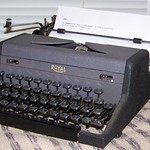 The more students read, the higher their reading scores, according to the U.S. Department of Education. Unfortunately, with iPads, cell phones and computers, it’s harder than ever for them to sit down with a book—so old fashioned, right?—and take a few minutes to read.
The more students read, the higher their reading scores, according to the U.S. Department of Education. Unfortunately, with iPads, cell phones and computers, it’s harder than ever for them to sit down with a book—so old fashioned, right?—and take a few minutes to read.
Reading and technology
 What do you think of when you see the words “reading” and “technology” in the same sentence? I tend to think of e-book readers and how easy it is to transfer stuff to, and then read, on my phone. But there is more to it than that. According to Dyslexia Action, around one in ten students struggle to read standard print.
What do you think of when you see the words “reading” and “technology” in the same sentence? I tend to think of e-book readers and how easy it is to transfer stuff to, and then read, on my phone. But there is more to it than that. According to Dyslexia Action, around one in ten students struggle to read standard print.
Typewriters? No thanks!
 There is something romantic about an old manual typewriter. The clattering of the keys sounds somewhat industrial, which connotes “industrious”. Bashing away at a typewriter is what real writers do. No spellchecker, no thesaurus, no internet, and no forgiveness if you make a mistake. So typing something that looked reasonable, and which didn’t involve too much correction fluid, gave one a sense of achievement.
There is something romantic about an old manual typewriter. The clattering of the keys sounds somewhat industrial, which connotes “industrious”. Bashing away at a typewriter is what real writers do. No spellchecker, no thesaurus, no internet, and no forgiveness if you make a mistake. So typing something that looked reasonable, and which didn’t involve too much correction fluid, gave one a sense of achievement.
Technology Destroying Love of Reading
It must be true, because Sir Tom Stoppard says so. At least The Register, unlike the mainstream news sources I've looked at (The Daily Telegraph, The Guardian and The Independent), all of whom seem to have merely published a press release, had the decency to (a) strike a cynical tone and (b) do some basic research. It says:
... the latest figures show 10,000+ students enrolling to study English last year, making it the seventh most popular subject - far ahead of maths, sciences or engineering. Another 7,800 enrolled to study combinations of humanities and languages, and 8,510 more for History.
All of which completely contradicts what Sir Tom said.
I've got nothing against Sir Tom -- I really like his Rosencrantz and Gildenstern Are Dead -- but I do get "exercised" when celebrities -- actors, authors, chat show hosts -- make these sort of blanket pronouncements which appear to be based on no evidence at all or, being charitable, the speaker's own experience.
Well, everyone is entitled to their point of view I suppose, but it's a great pity that all the newspapers seem to do is publish the press release as is. Thank goodness for mavericks like The Register!
See also "Is plagiarism really a problem?"
BETT Highlights #1: Technology and Reading
I thought I'd reflect on what, for me, were the highlights of the BETT show this year. By 'highlights', I mean things which I found inspiring or interesting. My first highlight concerns digital reading.
Sally McKeown, in her talk called Reading for Pleasure: The Technology and the Future of Literacy, mentioned the appalling statistics (from 2005) that 25% of the adult population in Britain reads litle or nothing. Of course, I don't know what they counted as 'reading': people seem to be reading text all the time, and presumably they read the TV pages to see what's on. Perhaps they also have subtitles on while they're watching TV. I know that's not exactly high literature, but we do need to define what we mean by 'reading' when having such discussions I think.
Indeed, Sally identified 5 different sorts of reading experiences being enjoyed by (young) people these days, these being
- Distributed narrative, such as by email (which reminds me: I keep meaning to have a proper look at Daily Lit, which allows you to read a book in email messages or by RSS feed).
- Wikis (eg Wikibooks)
- Twitter fiction
- Publishers' Microsites, and
- Digital fiction
A forthcoming issue of Computers in Classrooms will focus on digital reading, so I hope to explore these topics further then. If you have any views or experience of these or any other aspects of digital reading issues, or ebook readers, please consider contributing to the newsletter.
